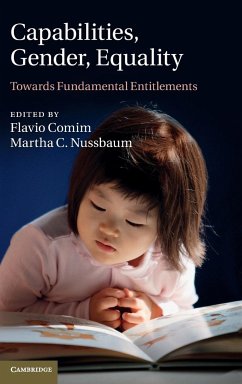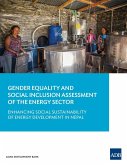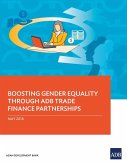Capabilities, Gender, Equality
Towards Fundamental Entitlements
Herausgeber: Comim, Flavio; Nussbaum, Martha
Capabilities, Gender, Equality
Towards Fundamental Entitlements
Herausgeber: Comim, Flavio; Nussbaum, Martha
- Gebundenes Buch
- Merkliste
- Auf die Merkliste
- Bewerten Bewerten
- Teilen
- Produkt teilen
- Produkterinnerung
- Produkterinnerung
Provides unique reflections on the capability approach and its relevance to new human development policies and political liberalism.
Andere Kunden interessierten sich auch für
![Gender Equality Results Case Study Gender Equality Results Case Study]() Asian Development BankGender Equality Results Case Study24,99 €
Asian Development BankGender Equality Results Case Study24,99 €![Gender Equality and Social Inclusion Assessment of the Energy Sector Gender Equality and Social Inclusion Assessment of the Energy Sector]() Asian Development BankGender Equality and Social Inclusion Assessment of the Energy Sector34,99 €
Asian Development BankGender Equality and Social Inclusion Assessment of the Energy Sector34,99 €![Equality in Water and Sanitation Services Equality in Water and Sanitation Services]() Equality in Water and Sanitation Services63,99 €
Equality in Water and Sanitation Services63,99 €![Gender Equality Results Case Study Gender Equality Results Case Study]() Asian Development BankGender Equality Results Case Study25,99 €
Asian Development BankGender Equality Results Case Study25,99 €![Innovative Economic, Social, and Environmental Practices for Progressing Future Sustainability Innovative Economic, Social, and Environmental Practices for Progressing Future Sustainability]() Innovative Economic, Social, and Environmental Practices for Progressing Future Sustainability202,99 €
Innovative Economic, Social, and Environmental Practices for Progressing Future Sustainability202,99 €![Innovative Economic, Social, and Environmental Practices for Progressing Future Sustainability Innovative Economic, Social, and Environmental Practices for Progressing Future Sustainability]() Innovative Economic, Social, and Environmental Practices for Progressing Future Sustainability156,99 €
Innovative Economic, Social, and Environmental Practices for Progressing Future Sustainability156,99 €![Boosting Gender Equality Through ADB Trade Finance Partnerships Boosting Gender Equality Through ADB Trade Finance Partnerships]() Asian Development BankBoosting Gender Equality Through ADB Trade Finance Partnerships26,99 €
Asian Development BankBoosting Gender Equality Through ADB Trade Finance Partnerships26,99 €-
-
-
Provides unique reflections on the capability approach and its relevance to new human development policies and political liberalism.
Hinweis: Dieser Artikel kann nur an eine deutsche Lieferadresse ausgeliefert werden.
Hinweis: Dieser Artikel kann nur an eine deutsche Lieferadresse ausgeliefert werden.
Produktdetails
- Produktdetails
- Verlag: Cambridge University Press
- Seitenzahl: 484
- Erscheinungstermin: 17. März 2014
- Englisch
- Abmessung: 235mm x 157mm x 30mm
- Gewicht: 845g
- ISBN-13: 9781107015692
- ISBN-10: 1107015693
- Artikelnr.: 39129878
- Herstellerkennzeichnung
- Libri GmbH
- Europaallee 1
- 36244 Bad Hersfeld
- gpsr@libri.de
- Verlag: Cambridge University Press
- Seitenzahl: 484
- Erscheinungstermin: 17. März 2014
- Englisch
- Abmessung: 235mm x 157mm x 30mm
- Gewicht: 845g
- ISBN-13: 9781107015692
- ISBN-10: 1107015693
- Artikelnr.: 39129878
- Herstellerkennzeichnung
- Libri GmbH
- Europaallee 1
- 36244 Bad Hersfeld
- gpsr@libri.de
Preface; Introduction: capabilities, challenges, and the omnipresence of
political liberalism Martha C. Nussbaum; Part I. The Capabilities Approach:
1. Perfectionist liberalism and political liberalism Martha C. Nussbaum; 2.
Rawlsian social-contract theory and the severely disabled Henry S.
Richardson; 3. Logos, pathos and ethos in Martha C. Nussbaum's capabilities
approach to human development Des Gasper; 4. Building capabilities: a new
paradigm for human development Flavio Comim; 5. Capabilities or
functionings? Anatomy of a debate Marc Fleurbaey; 6. From humans to all of
life: Nussbaum's transformation of dignity Jeremy Bendik-Keymer; Part II.
Gender: 7. Questioning the gender-based division of labour: the
contribution of the capabilities approach to feminist economics Ulrike
Knoblock; 8. Primary goods, capabilities, and the millennium development
target for gender equity in education Elaine Unterhalter and Harry
Brighouse; 9. The weight of institutions on women's capabilities: how far
can microfinance help? Muriel Gilardone, Isabelle Guérin and Jane Palier;
10. The capabilities of women: towards an alternative framework for
development Santosh Mehrotra; 11. Applying the capabilities approach to
disability, poverty, and gender Patricia Welch Saleeby; 12. Educational
transformation, gender justice and Nussbaum's capabilities Melanie Walker;
13. The social contract, unpaid child care and women's income capability
Hilde Bojer; Part III. Equality: 14. Lists and thresholds: comparing the
Doyal-Gough theory of human need with Nussbaum's capabilities approach Ian
Gough; 15. Nussbaum, Rawls, and the ecological limits of justice: using
capability ceilings to resolve capability conflicts Breena Holland; 16.
Social justice and Nussbaum's concept of the person John M. Alexander; 17.
God and Martha C. Nussbaum: towards a Reformed Christian view of
capabilities Jonathan Warner; Index.
political liberalism Martha C. Nussbaum; Part I. The Capabilities Approach:
1. Perfectionist liberalism and political liberalism Martha C. Nussbaum; 2.
Rawlsian social-contract theory and the severely disabled Henry S.
Richardson; 3. Logos, pathos and ethos in Martha C. Nussbaum's capabilities
approach to human development Des Gasper; 4. Building capabilities: a new
paradigm for human development Flavio Comim; 5. Capabilities or
functionings? Anatomy of a debate Marc Fleurbaey; 6. From humans to all of
life: Nussbaum's transformation of dignity Jeremy Bendik-Keymer; Part II.
Gender: 7. Questioning the gender-based division of labour: the
contribution of the capabilities approach to feminist economics Ulrike
Knoblock; 8. Primary goods, capabilities, and the millennium development
target for gender equity in education Elaine Unterhalter and Harry
Brighouse; 9. The weight of institutions on women's capabilities: how far
can microfinance help? Muriel Gilardone, Isabelle Guérin and Jane Palier;
10. The capabilities of women: towards an alternative framework for
development Santosh Mehrotra; 11. Applying the capabilities approach to
disability, poverty, and gender Patricia Welch Saleeby; 12. Educational
transformation, gender justice and Nussbaum's capabilities Melanie Walker;
13. The social contract, unpaid child care and women's income capability
Hilde Bojer; Part III. Equality: 14. Lists and thresholds: comparing the
Doyal-Gough theory of human need with Nussbaum's capabilities approach Ian
Gough; 15. Nussbaum, Rawls, and the ecological limits of justice: using
capability ceilings to resolve capability conflicts Breena Holland; 16.
Social justice and Nussbaum's concept of the person John M. Alexander; 17.
God and Martha C. Nussbaum: towards a Reformed Christian view of
capabilities Jonathan Warner; Index.
Preface; Introduction: capabilities, challenges, and the omnipresence of
political liberalism Martha C. Nussbaum; Part I. The Capabilities Approach:
1. Perfectionist liberalism and political liberalism Martha C. Nussbaum; 2.
Rawlsian social-contract theory and the severely disabled Henry S.
Richardson; 3. Logos, pathos and ethos in Martha C. Nussbaum's capabilities
approach to human development Des Gasper; 4. Building capabilities: a new
paradigm for human development Flavio Comim; 5. Capabilities or
functionings? Anatomy of a debate Marc Fleurbaey; 6. From humans to all of
life: Nussbaum's transformation of dignity Jeremy Bendik-Keymer; Part II.
Gender: 7. Questioning the gender-based division of labour: the
contribution of the capabilities approach to feminist economics Ulrike
Knoblock; 8. Primary goods, capabilities, and the millennium development
target for gender equity in education Elaine Unterhalter and Harry
Brighouse; 9. The weight of institutions on women's capabilities: how far
can microfinance help? Muriel Gilardone, Isabelle Guérin and Jane Palier;
10. The capabilities of women: towards an alternative framework for
development Santosh Mehrotra; 11. Applying the capabilities approach to
disability, poverty, and gender Patricia Welch Saleeby; 12. Educational
transformation, gender justice and Nussbaum's capabilities Melanie Walker;
13. The social contract, unpaid child care and women's income capability
Hilde Bojer; Part III. Equality: 14. Lists and thresholds: comparing the
Doyal-Gough theory of human need with Nussbaum's capabilities approach Ian
Gough; 15. Nussbaum, Rawls, and the ecological limits of justice: using
capability ceilings to resolve capability conflicts Breena Holland; 16.
Social justice and Nussbaum's concept of the person John M. Alexander; 17.
God and Martha C. Nussbaum: towards a Reformed Christian view of
capabilities Jonathan Warner; Index.
political liberalism Martha C. Nussbaum; Part I. The Capabilities Approach:
1. Perfectionist liberalism and political liberalism Martha C. Nussbaum; 2.
Rawlsian social-contract theory and the severely disabled Henry S.
Richardson; 3. Logos, pathos and ethos in Martha C. Nussbaum's capabilities
approach to human development Des Gasper; 4. Building capabilities: a new
paradigm for human development Flavio Comim; 5. Capabilities or
functionings? Anatomy of a debate Marc Fleurbaey; 6. From humans to all of
life: Nussbaum's transformation of dignity Jeremy Bendik-Keymer; Part II.
Gender: 7. Questioning the gender-based division of labour: the
contribution of the capabilities approach to feminist economics Ulrike
Knoblock; 8. Primary goods, capabilities, and the millennium development
target for gender equity in education Elaine Unterhalter and Harry
Brighouse; 9. The weight of institutions on women's capabilities: how far
can microfinance help? Muriel Gilardone, Isabelle Guérin and Jane Palier;
10. The capabilities of women: towards an alternative framework for
development Santosh Mehrotra; 11. Applying the capabilities approach to
disability, poverty, and gender Patricia Welch Saleeby; 12. Educational
transformation, gender justice and Nussbaum's capabilities Melanie Walker;
13. The social contract, unpaid child care and women's income capability
Hilde Bojer; Part III. Equality: 14. Lists and thresholds: comparing the
Doyal-Gough theory of human need with Nussbaum's capabilities approach Ian
Gough; 15. Nussbaum, Rawls, and the ecological limits of justice: using
capability ceilings to resolve capability conflicts Breena Holland; 16.
Social justice and Nussbaum's concept of the person John M. Alexander; 17.
God and Martha C. Nussbaum: towards a Reformed Christian view of
capabilities Jonathan Warner; Index.









